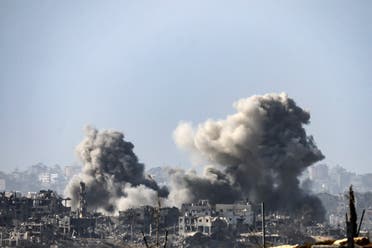Vanessa Ghanem - Al Arabiya
Global protests in solidarity with Palestinians are surging across the globe, demanding an end to Israel’s assault on Gaza and the immediate implementation of a ceasefire. The scale of demonstrations in cities such as Washington, London, New York, Paris, Athens and across the Arab world underscore the growing anger towards the ongoing violence and humanitarian crisis in Gaza. The protests were triggered by intense Israeli bombardment, massive displacement, and strikes on hospitals and schools, with thousands condemning what’s been described as a “massacre” of Palestinians.
On Thursday, the health ministry in Gaza reported that 10,812 people had been killed in the weeks-long war between Israel and the Hamas militant group controlling the Palestinian territory. Of those casualties, at least 4,412 are children. Meanwhile, another 26,905 people have sustained injuries in the wake of a devastating Israeli offensive in retaliation for a brazen Hamas attack on October 7, killing roughly 1,400 people, according to Israeli authorities. The gunmen also took about 240 people hostage.
Following over a month of relentless airstrikes, the United Nations stated that hundreds of thousands of people remained trapped in urban conflict areas, facing a severe humanitarian disaster with insufficient access to food, water, electricity and medical care.
Palestinian girl Orheen Al-Dayah, who was injured on her forehead in an Israeli strike, has her wound stitched without using any anesthetic due to a dearth of pain relief medication, at Al Shifa hospital in Gaza City, November 8, 2023. (Reuters)
Israeli Prime Minister Benjamin Netanyahu has consistently rejected calls for a ceasefire with Hamas, labeling them as part of an “axis of evil” led by Iran. He ruled out a temporary ceasefire in the besieged Gaza Strip, emphasizing the continuation of military activities.
Netanyahu insisted on a ceasefire that includes the release of hostages, contributing to the growing international pressure for a pause in Gaza strikes.
Israel and Hamas are currently engaged in indirect negotiations facilitated by Qatar. The discussions are centered on the potential for a ceasefire lasting between one to three days, linked to the release of approximately 10 to 15 hostages.
Mounting pressure in the US
In the United States, the Biden Administration is facing mounting pressure domestically and internationally to advocate for a ceasefire in the Israel-Hamas conflict. Democrats within the party, including progressives, are urging Biden to use leverage to push for a resolution, stressing the humanitarian impact and civilian casualties. Despite Israel’s goal of dismantling Hamas and unwavering bipartisan backing in Congress for the country’s self-defense, there is growing external pressure for the US to prioritize a ceasefire. Emotions are running high at the White House as the ramifications are felt globally.
Yesterday, Israel agreed to implement daily four-hour pauses in northern Gaza to facilitate humanitarian efforts. The White House announced the agreement, specifying that Israel would give at least three hours’ notice before each pause. This will allow the movement of humanitarian assistance to those in need, John Kirby, the National Security Council spokesman, said. He also mentioned that Israel was opening a second corridor for civilians to flee the areas that are the current focus of its military campaign against Hamas.
The US still does not endorse a ceasefire, arguing it would allow Hamas time to regroup.
“The delay in achieving a ceasefire is influenced by Israel’s stance, as it aims to complete its mission of eliminating Hamas’ infrastructure in Gaza and potentially forcing their leadership out. Despite some American efforts, the Israeli government remains unyielding,” Raghida Dergham, founder and executive chairwoman of the Beirut Institute, told Al Arabiya English.
“The recent G7 meeting reflects increased pressure on Israel to reconsider its position. I wonder if Netanyahu can continue to ignore international calls,” she added.
Top diplomats from the Group of Seven jointly called on Wednesday for “urgent action” to assist civilians trapped in a dire situation in Gaza. Their unified stance includes advocating for humanitarian pauses and corridors to allow the entry of aid and the evacuation of people from the affected areas.
Can influential powers impact the war’s trajectory?
The toll on civilians is immense, and the world is watching with rage and despair. The majority of the West couldn’t continue to bless the extent of the Israeli retaliation against Hamas.

A smoke plume rises during Israeli bombardment in the Gaza Strip, near a position across the border in southern Israel on November 9, 2023 amid ongoing battles between Israel and the Palestinian Hamas movement. (AFP)
“Not reaching a ceasefire would be disastrous. Dual-ended pressure is crucial – from Europeans on Israel, potentially involving sanctions if they dare, and from the firm stance of the Americans, insisting that Israel cannot continue without a ceasefire,” Dergham noted.
She added: “Arab nations must position themselves, outlining not just their humanitarian obligations but also asking the Americans to propel Israel toward a sustainable settlement and peace.”
“The Arab states have a crucial role in this restructuring process. Saudi Arabia, in particular, can play a pivotal role in coming up with an eventual resolution, because it currently has leverage to influence Israel, prompting it to adjust its policies and embrace the internationally endorsed two-state solution. If Israel desires to normalize relations with Saudi Arabia, it must read between the lines and stop evading its responsibilities towards the Palestinians.”
Arab foreign ministers convened in Saudi Arabia yesterday ahead of an emergency meeting of the Arab League on Gaza scheduled for Saturday. Saudi Arabia is set to host two summits this weekend, bringing together Arab leaders and Iran’s president to address the escalating conflict, sparking concerns of a potential regional escalation.
What happens after?
Experts agree that the war will have a long-lasting impact. People on both sides of the conflict, now entering its second month, acknowledge that it will bring about profound shifts in attitudes, influencing how Israelis and Palestinians perceive their future and each other.
Israel has started to lose public opinion and Arab buy-in. According to Dergham, both Netanyahu and Hamas are weakened and serve as obstacles to achieving a lasting peace; they are unlikely to have a seat at the Middle East negotiation table, having effectively removed themselves from the broader equation.
“A necessary distinction worth pointing out is that, while the Israeli public will decide Netanyahu’s fate, the Palestinian people will not be the ones deciding Hamas’ future. That will probably be in the hands of the Iranian regime, which has made some gains following the October 7 attack,” she said.
“Ultimately, Iran might surprise everyone by participating in the grand bargain that secures its interests in exchange for renouncing its commitment to destroying Israel. The dynamics of such a grand bargain might still be uncertain, and it all depends on America’s determination to convince Israel that the time has indeed come to choose lasting peace. Failing to do so could intensify the threat of more attacks like the one witnessed on October 7.”
